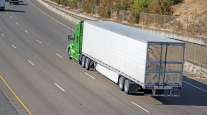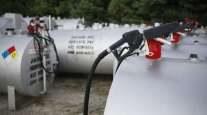Diesel Prices Up 4.4¢ to $3.976 as Economy Stokes Demand
This story appears in the April 11 print edition of Transport Topics.
The diesel-price spike continued last week, as the U.S. retail average rose another 4.4 cents to $3.976 a gallon, the Department of Energy reported.
The regular gasoline average, meanwhile, jumped 8.8 cents to $3.684 a gallon, DOE said after its April 4 survey of fueling stations.
Diesel is now 96.1 cents a gallon more expensive than the corresponding week of 2010, and gasoline is 85.8 cents higher. Diesel has risen in 17 of the past 18 weeks, for a net gain of 77.9 cents. Gasoline has risen in 16 of the past 18 weeks, for a gain of more than 72.6 cents.
An analyst said the higher fuel prices are part of a strengthening economy and that a recent rally in U.S. manufacturing is putting more pressure on diesel.
“Diesel is going to follow with what manufacturing does, and in the last quarter . . . manufacturing has been picking up,” said Bruce Gress, director of petroleum risk management for Pilot Flying J, the largest U.S. truck-stop chain.
Gress said a hotter factory sector is a double-edged sword for trucking — to ramp up their factories and create freight for truckers to haul, manufacturers must burn diesel that, otherwise, truckers could use.
Also last week, the price of crude oil hit a new 30-month high, when futures on the New York Mercantile Exchange closed at $110.30 a barrel on April 7, Bloomberg News re-ported. That was the highest closing price since September 2008.
With pump prices rising, one carrier’s fuel manager said his company has intensified its focus on driver training. In the process, the company discovered that veteran drivers are sometimes the least fuel-efficient.
“It’s your senior drivers who are your poorer performers,” said Keith Pease, vice president of safety for refrigerated carrier Heyl Truck Lines, Akron, Iowa.
Veteran drivers are “not going to use the [fuel-saving] technology you paid for on your truck until you bring them in” for additional training, he said.
Pease said that after Heyl bought auxiliary power units to cut idling time, he found some veteran drivers would run APUs while idling their trucks.
Drivers who use APUs properly can achieve an average of 6.9 miles per gallon — significantly higher than the company baseline of 6.35 mpg, Pease said.
Heyl’s primary strategy for reducing its fuel bill is an incentive program for drivers.
If drivers “achieve zero to 0.5 mpg over our baseline [of 6.35 mpg], they get a penny-a-mile more. If they’re more than 0.5 mpg better, we’ll double that,” Pease said.
Heyl has run its bonus program for five years and each year has paid out more bonuses to drivers than in the year before. The result is a net reduction in Heyl’s overall fuel costs, Pease said.
The importance of fuel economy also was trumpeted by the head of North America’s biggest truck builder at the Mid-America Trucking Show.
“Diesel will get more expensive,” Martin Daum, CEO of Daimler Trucks North America, said on March 31. “Like death and taxes, this is inescapable and will shape nearly everything we do in product design and development.”
Analysts also believe that high diesel prices are now a fact of life for U.S. carriers.
One of these people said the only thing that would lower prices substantially is an economic catastrophe comparable to the one that occurred in 2008.
“There’d have to be some calamitous thing, and economic [collapse] like in 2008,” DOE analyst Neil Gamson said.
If the price of diesel is to decline, the “fear premium” must be eliminated from the fuel’s cost, Gamson and others said.
“There’s a sizable fear premium in the prices out there,” said Pilot Flying J’s Gress. “No one would be surprised by a pullback, but with the geopolitical tensions [in Libya], traders really don’t see a huge pullback.”
Gamson agreed that even a swift resolution to the conflict in Libya “wouldn’t drop prices precipitously. The whole exporting infrastructure would take a while to get back to normal.”
Noel Perry, an economist with FTR Associates in Nashville, Ind., expects that the fear premium indeed will fade.
However, Perry warned that oil prices, the largest cost-driver for transportation fuels, would soar if crucial oil-producing nations such as Saudi Arabia were ensnared in the civil unrest that has spread through parts of the Middle East.
“The only thing to really worry about is if the problems spread to Saudi Arabia,” Perry said.
Senior Reporter Rip Watson and Associate News Editor Jonathan Reiskin contributed to this story.




